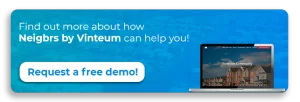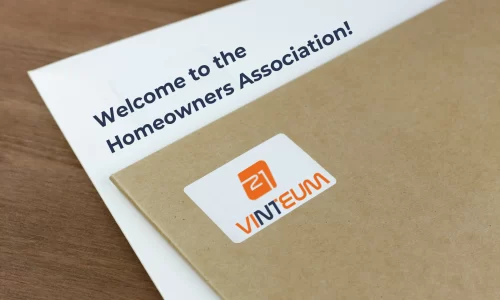Email has revolutionized how we communicate. With over 4 billion active email users worldwide, this powerful tool brings convenience and efficiency. HOA email communication has become increasingly popular in recent years. It is now easier for board members and residents to communicate online.
But to ensure smooth operations and prevent issues, it’s essential to follow proper email etiquette and implement best practices.
Whether you’re new to HOA email communication or looking to improve your current practices, you’re in the right place! We’ll share three best practices to help you avoid common mistakes and ensure streamlined communication within your HOA.
1.Establish an HOA Email Policy
To effectively manage your HOA’s email communication, it’s crucial to create and implement an HOA email policy. This policy acts as a document that lays out guidelines for how board members and residents should use electronic communication tools. Its main purpose is to minimize legal risks, ensure security, and prevent miscommunication.
Without a policy in place, innocent mistakes can occur. For example, a board member might mistakenly send association-related information using their personal or work email address. In such cases, it’s important to use the official board of directors’ email address to send messages. This helps prevent important information from getting lost or becoming hard to retrieve. Plus, keeping your personal and volunteer roles as a board member separate is more professional.
To give you a better idea, here are some topics your policy can cover:
- Who is authorized to send emails on behalf of the HOA?
- What email address should be used for official communication?
- Which topics should not be discussed through email?
- Who is responsible for creating and updating the email distribution list?
- How should individuals without email addresses be informed?
Once you’ve finalized the policy, make sure all board members sign it. Equally important is sharing the policy with your residents. If homeowners aren’t aware of its existence, it won’t be effective. You can store the policy on your HOA website or include it as an attachment in regular HOA newsletters for easy access.
2. Create an Email Consent Form
Creating an email consent form is an essential step to ensure smooth communication with your residents. This simple document allows residents to provide their consent to receive notices and updates from the board via email. They just need to fill in their email addresses, and the completed forms are collected by the board of directors. Let’s explore why having an email consent form is so beneficial.
First and foremost, it enables you to gather resident email addresses and maintain an updated community directory. This helps ensure that your database is accurate and reliable. Second, it helps prevent any complaints from residents. Without their consent, receiving unexpected emails might make homeowners feel that their privacy is being violated. Lastly, by offering the email consent form, you raise awareness about your HOA’s email communication. This means that residents will know to expect important information via email. This awareness is crucial because not everyone checks their emails regularly. When residents know that the association might reach out through email, they are more likely to stay in the loop and check their inbox more frequently.
Keep in mind that not everyone has an email address. By asking residents to complete the consent form, you can identify who does and doesn’t have this communication tool. This knowledge allows you to explore alternative channels for those without email addresses. Additionally, it provides valuable insight into how many homeowners use email as a communication channel. If you discover that the majority of residents don’t use email, it might be worth considering other HOA communication tools that better suit their preferences.
3. Avoid Making Decisions via Email
In certain states, such as California, making decisions through email communication is prohibited. It’s always important to refer to Federal or State laws and your governing documents. We strongly recommend steering clear of decision-making via email, even for small matters. Misunderstandings can easily arise when communicating electronically.
It’s also crucial to understand that email can never replace the importance of a properly announced HOA meeting. During these meetings, decisions are typically made once the minimum meeting quorum is met. Unlike email communication, meetings offer a higher level of transparency. With emails, you can never be entirely certain if all recipients have received or read the messages. Meetings, on the other hand, offer more room for discussion. If it’s not possible for all board members or homeowners to gather in person, conducting a virtual HOA meeting is a great alternative.
Bonus Tip: Pause and Reflect before Hitting Send
This tip holds true for all your HOA communication tools.
It’s crucial to understand that whatever you write and send will be saved in writing forever.
We’ve all experienced moments of anger and frustration where we said things we later regretted. Typically, those words dissipate into thin air since no one is recording our casual conversations. However, an email serves as written evidence that remains long after our emotions have subsided.
“You are master of what you say until you utter it, once you deliver it, you are its captive.” – Ali Ibn Abi Talib A.S
Take a moment to pause and reflect before speaking or writing, ensuring that your words convey thoughtfulness and respect. By doing so, you’ll avoid unnecessary conflicts and maintain positive communication within your HOA.
Top Platforms for HOA Email Communication
You can find plenty of platforms out there for sending emails. Whether you’re on a budget or willing to invest, there are platforms tailored for HOAs as well as those that work for different industries. Let’s take a look at two excellent platforms that HOAs can consider:
1. Neigbrs by Vinteum
Neigbrs by Vinteum is a solution designed for HOAs and Condo Associations. It offers an all-in-one platform with five different communication channels, including emails. With Neigbrs, board members, managers, and residents can effortlessly send emails directly from the platform, streamlining their communication process.
The best part about Neigbrs is that it goes beyond just sending emails. It offers a one-stop platform where you can manage every aspect of your community. You have the power to handle tasks like reserving amenities, setting up websites, and much more, all within the same user-friendly platform. Neigbrs improves communication and streamlines community management.
2. Gmail
Gmail is renowned worldwide for its widespread usage across various industries. It has earned its reputation as a leading email service provider, trusted by individuals and organizations alike. With millions of users globally, Gmail has become a go-to platform for email communication in both personal and professional settings. It has become the preferred choice for businesses, non-profit organizations, educational institutions, and government entities.
From small startups to multinational corporations, Gmail’s robust capabilities meet the diverse needs of users worldwide. Gmail’s strong security measures, including advanced spam filtering, phishing detection, and encryption, instill confidence in users that their emails and information are well-protected.
A downside of using Gmail is that it’s not specifically built with HOA needs in mind. As a result, it may lack certain important features. Many communities find it challenging to juggle multiple platforms for different purposes, which is why consolidating all efforts into a single platform makes more sense. By opting for a dedicated HOA platform, you can ensure that you have all the necessary tools and features in one convenient place.
3. Constant Contact
Constant Contact is widely-used email marketing platform in the United States. It caters to various industries and organizations, including HOAs. With its user-friendly interface and robust features, Constant Contact offers HOAs the opportunity to improve their email communication efforts.
The platform offers a wide range of customizable templates and easy-to-use editing tools. It’s ideal for creating engaging email campaigns and newsletters.
It also provides valuable insights and analytics to measure email performance. This will help you determine the best time and day to send out emails.
While Constant Contact is not specifically designed for HOAs, it still offers a reliable and effective solution for managing email communications within an HOA.
Final points on HOA Email Communication
By following these three tips and our bonus advice, you can guarantee that your HOA email communication will be effective and transparent. Moreover, you’ll be able to avoid resident complaints and frustrations. Mastering the art of communication can be a challenge, especially in community associations where people of different backgrounds and ages reside together. When searching for the right platform for your community, make the most of free trials and demos. This will help you determine if it’s a good fit for your community’s needs.








7 Responses